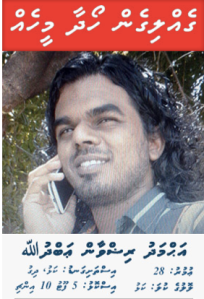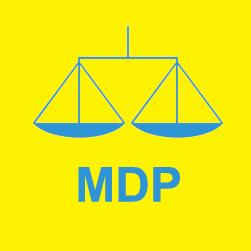As a Maldivian who came of age during the years of the reform movement, I have lived through my fair share of political upheavals. We peacefully defeated a 30-year dictatorship, survived the violent overthrow of our first democratic government, and are now fighting an insecure kleptomaniac to get back what is rightfully ours– a just and democratic Maldives. With the irony of ironies being that it may require working with the previous dictator we overthrew to overthrow this one. Welcome to #Mordis.
In a country where egregious is an understatement for the state of the judiciary, you would think we would now be used to worst-case scenarios becoming the latest breaking news item. I certainly am when it comes to news of trials concerning the Government’s latest political opponents. How many years is Adeeb facing? But the news of the Supreme Court’s vile disregard for every single law – divine and civil – that governs us in the case against Humaam 10 days ago was a new and dangerous low that was so severe, it felt like a physical blow.
 Many others felt the same, and for them their first instinct was to be outside the Supreme Court building that evening, for the sake of their conscience, as much as for Humaam. Others frantically tweeted, posted Facebook statuses, exchanged their outrage on whatsapp groups and implored those who hadn’t yet spoken out to do so. 10 days on, and the Supreme Court have sentenced yet another young man to death and the Government have moved on, with President Yameen using the executions as an Eid gift he will ‘unwillingly’ carry out in the name of the people.
Many others felt the same, and for them their first instinct was to be outside the Supreme Court building that evening, for the sake of their conscience, as much as for Humaam. Others frantically tweeted, posted Facebook statuses, exchanged their outrage on whatsapp groups and implored those who hadn’t yet spoken out to do so. 10 days on, and the Supreme Court have sentenced yet another young man to death and the Government have moved on, with President Yameen using the executions as an Eid gift he will ‘unwillingly’ carry out in the name of the people.
Dr. Afrasheem was murdered in a year plagued with violence. Most Maldivians will not forget where they were and what they were doing when they heard the news. Nor the events that followed. There were frantic cover-ups, politically motivated arrests, and an opportunity for the then Waheed Government to look like they were doing something constructive by calling for the return of the death penalty. Serious concerns about the motive for the gruesome murder, the perpetrators and more importantly the funding and the facilitators behind them have been conveniently pushed aside by a Government intent on putting to death a boy who is most likely just a pawn in this terrible play for power.
In most debates on the death penalty in the Maldives, abolitionists are shut down with people shouting, ‘but it’s Islamic Shari ‘a’. The more rational will reluctantly then agree that our judiciary does not in any way meet the high standards required to implement Shari ‘a. In Humaam’s and every other death sentence passed by this judiciary, this is a gross understatement. Islam’s wider teachings about justice and forgiveness have been casually dismissed over shadowy political objectives in the name of religious retribution. The verses on choosing forgiveness at every opportunity, to err on the side of caution in case of any doubt, and on the supremacy of a fair trial have been forgotten in the race to ‘deter crime’ by committing an even greater one.
Placing the blame on Humaam’s murder squarely on the Supreme Court is not an option. No one had any expectation of getting justice from our honourable thugs in robes.
Then you have their facilitators, support staff, the minions. The staff in the Supreme Court who assisted the Supreme Court justices to hold a hearing and deliver a death sentence at 2.20am when their bosses refused to accept a letter requesting a delay in punishment at 8pm, citing it was outside office hours.
The state prosecutors, educated in Shari ‘a and law, who have gone along with this farce from day 1, who have not once objected to the illegality of these proceedings. Prosecutor Generals of the past, the one in prison and the current, Aishath Bisham who spat on the courage of Afraasheem’s heirs and essentially said, ‘but they didn’t really say don’t kill him did they’? The anonymous witnesses with the contradicting statements. The majority of the members of our legal community who continue to say nothing.
The Special Operations Police who were outside the court placing barricades and herding protesting citizens away, while the real crimes were once again taking place inside the gates of Theemuge. The Corrections Officers who speak to the press as if procedures to execute a man is an every day occurrence equivalent to the Maafushi catering schedule. The Commissioners of Police, the investigative officers, the intelligence officers and analysts who, faced with a flimsy case, still refuse to protect and serve the public.
The Foreign Ministry boffins who continue to churn out nonsensical press releases defending the Government, while ‘celebrating international human rights’ at the UN. The Jeff Waheeds and the Hala Hameeds who hide behind their education and privilege to deny Maldivians the very basic of fundamental rights. The spineless, cowardly, President’s Office Spokespersons.
The Islamic scholars who refuse to speak up. The Islamic scholars who defend it. The ‘Islamic NGOS’ who call for beheadings rather than lethal injections because its more humane!
The 5 individuals who petitioned the High Court to remove the President’s authority to commute death sentences. The Government and the Courts who let it happen.
The Cabinet Ministers who resigned – Dunya and Umar – after instigating, encouraging and defending their blood lust and political objectives, which has led to this dire turn of events. The former Government officials in exile/jail – Dr. Jameel, Adeeb – who, instead of using their power to stop these actions (when they were in Government), whispered into Yameen’s ears the judicial niceties he should say in response to questions by the media.
The Cabinet Ministers who haven’t resigned, and the ones who continue to accept positions on this God forsaken Cabinet for the glory of the title and the Ministerial car.
Vice President Jihad who as Finance Minister budgeted RF 4million for a death chamber.
Muizzu, the silent and deadly man in the Cabinet who has engineered the destruction of Male’ city and its surroundings.
Anil – the Attorney General, the man who instead of advising the Government against carrying out illegal activities, covers them up with a veneer of facetious legal jargon. His degree in human rights law will come in handy when they’re done murdering Humaam.
Azima Shukoor – truly the lawyer every Mafia boss wants by their side. Under
Waheed, she proposed and drafted legislation to carry out the death penalty by lethal injection. Under Yameen, she’ll see Humaam hang.
Dr. Aishath Shiham, who, oversees the education of all Maldivian children and does not care what kind of example she is setting for them by being part of a murderous Government. If she wont resign citing her professional background, she should at least do it out of loyalty to her former dictator boss Maumoon.
Shainee – There isnt enough space.
Zenysha Shaheed Zaki – the youngest Cabinet Minister ever to be appointed in the country, having had every privilege in the world, accepted willingly a job she does not need, to defend a Government which experience from her time in the MFA should have taught her is indefensible. What a total betrayal of the good work she did at ARC.
The pro democracy/human rights international community who have watched and waited for far too long without taking concrete action against these mercenaries in our Government.
Then there’s Majlis and the MPs and the former MPs who have often jumped at the chance of implementing the death penalty to deter crime even in the face of inexhaustible evidence saying otherwise. MP Ahmed Mahloof, Ahmed Rasheed (Cockatoo), Riyaz Rasheed, Tom and every other short sighted, narrow minded politician who have clearly not thought of the repercussions of their actions.
And us. What about us, the wider public? How many of us have thought, oh they’ll never actually go through with it? Only to witness Yameen do every single crazy illegal thing he has promised to do. How many of us have thought, but Humaam is a criminal, isnt he? How many of us know people who dismissed Evan Naseem’s murder in jail similarly? How many of us have spared time to write a tweet, post a FB status, go to the Artificial Beach gatherings, sign a petition, write a letter or simply talk to someone else about this? How many of us have taken the time to go back and look at the coverage of this case, to ask why the Government is so eager to kill this boy despite the wishes of the victim’s heirs? How many of us recognise the principles of Islam in these events?
President Yameen stood up today in front of the nation and used his Eid address to announce that he would go ahead with the death penalty no matter who criticises him. He said he would do it for the people, in the name of all Maldivians. Isn’t it time enough Maldivians said no? #NotInOurName. We are a small, close knit country. There is most likely a very small degree of separation between me and the individual who will eventually tie the noose around Humaam’s neck. I would like to do everything possible to spare their conscience this terrible fate.




